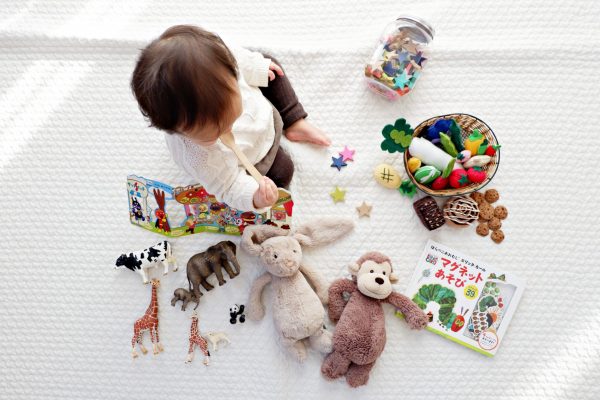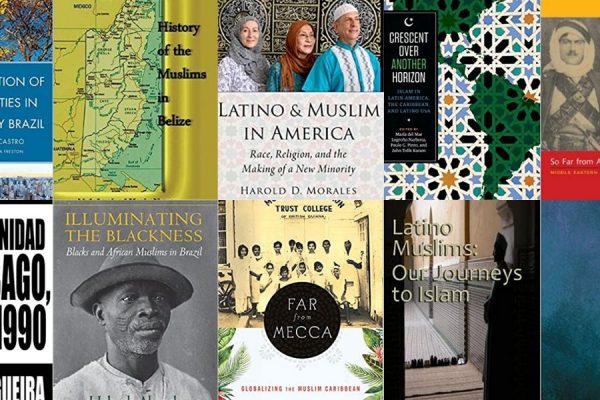“Islamic fiction is so powerful because you can tell everyday stories, and just make the heroes of the Muslim and make their motivations Islamic. And through that you have such power, to change your narrative, and to speak your own narrative, and be able to influence your children positively.”
“Islamic fiction is so powerful because you can tell everyday stories, and just make the heroes of the Muslim and make their motivations Islamic. And through that you have such power, to change your narrative, and to speak your own narrative, and be able to influence your children positively.”
“I constantly hear like, oh, you know, don’t talk to them about you know, the afterlife, don’t talk to them about death. Don’t talk to them about, you know, these things,” says Mariam Charara, 31-year-old mother of two and author of five upcoming books aimed at teaching Islamic concepts to young kids via creative methods.
“I personally don’t think it’s ever too young. A lot of times we underestimate our children, our children take in a lot more than we think they do,” she continues, and science seems to agree. Research studies have shown that kids as young as three months are able to retain useful knowledge, with other studies highlighting the development of moral values by ages 4-5.
“It’s definitely been very effective,” Charara says, talking about using the book But Why Is the Hijab So Special? to introduce her five-year-old daughter to the concept of the Islamic female hijab. This illustrated book, written by author and publisher Sahar Jaber, caters to kids as young as three as it follows the story of a young Muslim girl who sets out to explore the subject.
“Kids foster all of that information. They’re like sponges, right? So anything they are around and are surrounded with, they pick up. So it was very important to me to like, make sure that my kids have an endless amount of sources where I can teach them, I could talk to them, and they can foster those Islamic values. So when Sahar’s book came out, I remember talking to my daughter about hijab, since she was two years old. I mean, I know it’s not Wajib (obligatory) on her yet, but it’s really important to let them know from a very early age what the rules are.”
The reaction from her five-year-old has been very promising. “She was really excited about it, and reading these books, reading Sahar’s book, reading other hijab books that I have bought my daughter really has her now inquisitive… She’s asking me questions,” says Charara, adding that her questions are “obviously stemming from the information that she’s receiving.”
The author of the book, Sahar Jaber, who is also the founder of Figs and Olives Publications, describes the reason for much of females’ issues with the hijab are that they do not allow safe environments to discuss the subject, and having books like this one helps create the much-needed environment between mothers and daughters which allow for the comfortable and confident sharing of information on the topic.
“We often teach children in the same manner that adults learn through lectures,” says Jaber, “when in reality, we need to bring the idea to them in their form of education. Therefore, writing about Islamic (topics) in a fun and educational manner properly sends the message to them.”
Fiction as a tool for formal education
The effect of using fictional content that is crafted to be relevant to the life of the target child seems to be greater than non-fictional academic textbooks. According to research, in what’s known as ‘narrative transportation,’ an interesting phenomenon takes place in which readers who get immersed in any given fictional (or non-fictional) story become induced to give an emotional reaction, which is often a social act or commitment. It seems that making use of storybooks and fictional literature is not a very lost method for formal education either.
Schools are increasingly employing fictional books designed and authored especially to teach a range of topics to kids from math and science to history and social studies, starting from pre-school up until the age of 12. At one Muslim school based in Toronto, Canada, kindergarten homeroom teacher Tabassum Ali regularly engages in developing lessons using storybooks.
“In fact, in our science and social studies, we don’t have a textbook kind of thing… We follow [a] curriculum [that goes] by the name of Five in a Row, and that includes a set of storybooks. So from those storybooks, we make our science and social studies lessons,” says Ali.
Five in a Row, or FIAR, is a comprehensive homeschooling curriculum catering to preschoolers all the way up to pre-teens. It employs the creative arts of storytelling and illustrations to teach young kids about almost everything from basic science and math to social studies and art. Jane Claire Lambert, a third-generation educator, author, and creator of FIAR believes in making learning fun.
“We are committed to making the educational process as exciting, enjoyable, and full of fun as we can, knowing that children who are thus captivated will indeed work hard during their educational time for the very reason that they are excited about learning,” says Lambert in a blog.
Ali believes that these fictional books are far more effective when it comes to teaching children about important topics than non-fictional textbooks. “Storytelling is an effective way of engaging children… In a way, storybooks feel, sometimes, informal, but they make it [all] relevant to the real life of the student… In previous years, science was taught to even kindergarteners in the way of very academic books, but in that way, they don’t understand because they’re too young.
“If we tell them this is useful, that is useful, it just goes over the surface of the mind, they’re not able to comprehend it. But if we tell them, okay, this is the way this child used it, in their own life, this parent did this, this teacher did that. So in the way of storytelling, it makes it more coming (sic) to life for them, like more relevant.”
However, she is also aware that using such books may come with possible implications.
Possibility of harm
While teaching a class about Thanksgiving food to a group of Muslim students, she noticed her students’ thinking patterns were influenced by these books. “So they were looking and reading and talking about things which they had never tasted, which didn’t belong to their culture. And it seemed attractive to them. When the same way, if they read the books belonging to their own religion, in fact, if something is written about Ramadan, so they would relate it to themselves saying that, okay, in the story, somebody is opening the fast with dates that we know.”
She feels that though these books had a lot to teach, the students would have been able to better find a sense of belonging if they were based on themes pertaining to their own religious and cultural rites and rituals.
While the social impact of reading fictional material is considered by psychological and cognitive-behavioral research studies to be in huge amounts, the exact extent to which religiously unaligned literature can affect the psyche of Muslim kids and young adults is an area of study that needs more research. For many Muslim parents and educators though, the day-to-day experiences of their kids suggest that there definitely is some sort of an effect, and not one they would necessarily call positive. It gets worse when the literature – and multimedia as a whole – is not just non-conforming to cultural and religious Muslim norms, rather particularly Islamophobic and hateful.
“I think, young Muslims internalize an inferiority complex, in the sense that if you’re reading a book, or watching a film, and the bad character, or the one that’s doing something wrong, is a Muslim, this begins to build up over time, right, you have your idea of who the villain is… like everyone knows, like, if you watch a Bond film, the villain is either Russian, or Muslim,” says Tehseen Merali with a laugh. “That’s what you expect… inadvertently, these things, they come in, they become internalized.”
Based in the United Kingdom, Tehseen founded Sun Behind The Cloud Publications right after she received her Master’s in Publishing from UCL, ten years ago. The aim was to do something for the English-speaking Muslim community, and the journey that followed led to the company publishing tens of books themed around Islamic topics, both originals and translations, catering to a variety of age groups.
Fiction can change the narrative
Merali believes that Islamic fiction has the ability to change the anti-Muslim narrative set by corporate media outlets, publishing centers, and production houses.
“Islamic fiction is so powerful in that sense, because you can tell everyday stories, and just make the heroes of the Muslim and make their motivations Islamic. And through that you have such power, to change your narrative, and to speak your own narrative, and be able to, you know, influence your children positively… when it comes to fiction and Islamic literature, your license is completely, you know, free and open.”
The challenge
Merali feels that the field of Islamic fiction is an important and exciting one, albeit one still developing. According to her, the scarcity of Islamic fictional literature for young adults is one of the challenges that face the community nowadays.
“You know, once the children become a bit more independent, once they reach like, 10, 11, 12, the tweens age, there’s a lot less available for them. And it’s a lot more difficult for parents to influence their children, okay, and also they become a lot more picky, because it’s not the parents buying the books for them, the children have to actually like the books in order for them to read it,” adds Merali. According to her, the pre-teens and young adult ages are the most vulnerable when it comes to getting affected by the narrative due to the amplitude of external influences that exist in those years.
“They have so many other external influences on them at that point that it’s like, oh, I don’t want to read Islamic literature, it’s boring, or, you know, whatever. That’s an age where we start to lose them, you know, and in order to retain them, we have to work on that age,” she believes.





